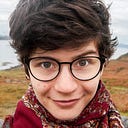What science-fiction taught me about being a social sciences scholar
There are so many memes making fun of how professions are represented on screen. Indiana Jones, the archeologist who “never does archeology” and “destroys every temple he visits” is a good candidate to make fun of the gap between reality and fiction. So recently, I wondered: where in science-fiction do we find social sciences scholars? What do they do? How are they represented? Can I maybe learn a thing from them?
Daniel Jackson, in Stargate, taught me that you can act as an anthropologist to study people on other planets, be one of the best translator of hieroglyphs on Earth, speak multiple languages, be an adventurer, a treaty negotiator, be excellent at team management, and be an archaeologist. Plus, you are the wisest and kindest person and the team and eventually ascend to a higher plane of existence.
But you will first have to fight for funding because your boss want to gain knowledge about weapons and engineering, not anthropology and culture. That part is realist enough.
Robert Maxwell, from V — the original mini-series, taught me that humans and aliens alike think of anthropologist as a real scientist, one that can fight the alien invasion.
Robert Maxwell taught me scholars are wise enough to join the resistance early. And that anthropologists make good parents to half-alien / half-human children, because of their knowledge of different societies.
Mork, the alien anthropologist from Mork and Mindy taught me researchers should be kind and true to themselves, putting the interests of their subjects before those of the jobs. Plus they make great friends.
River Song, from Dr Who, is also an anthropologist, although what that entails for her daily life is unclear. She, much like many archeologists, seem to be a treasure hunter.
Oh there are linguists too! Louise Banks in Arrival deciphers alien writing and language amazingly quickly. Finally a scientist working in a team! I loved the importance given to data processing in the movie.
Then of course there are historians, who generally have a crucial role in plots about time-travel. In Timeless, the main historian character, Abigail Spencer, have no period specialty and seem to remember all dates in human history. Though, contrary to Dr Who, she acknowledges that history is not made of big figures — but of movements and groups of which we remember specific individuals.
So, I can easily think of archeologists, anthropologists, historians and linguists, or any mix of the four in on-screen science-fiction. They are obviously important to understand technologies and shape the future. I can think of psychologists as well — in Asimov’s work for instance — though none on screen. There is definitely a case for saying geography / environment research is necessary, such Slartibartfast in H2G2. But I do not think I have ever seen or read about a major science-fiction character who’s a sociologist or an economist. Maybe because they are working too close from home?
